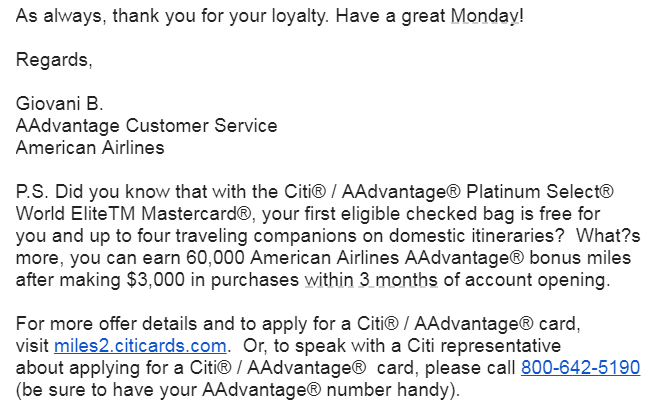From a marketer’s standpoint the great thing about electronic communications — and data — is that your messages can be mass-customized so that they are directly relevant to the consumer.
In theory this drives far better response, and it turns unwanted marketing messages into useful information. You see what makes something “junk mail” is precisely that it isn’t relevant to us, not that it’s marketing.
Last week I received an email reminding me that I can earn elite qualifying miles for spend with one of my credit cards on which I’ve already maxed out the ability to earn qualifying miles based on spend for the year. That’s a fail. Someone didn’t do the right data pull, excluding those who had already completed the task. (Sometimes the issue is timing, the list is pulled weeks in advance and loses its relevance to some consumers in the meantime, but that’s not the case here.)

But I was really struck by this message from American AAdvantage Customer Service that on the one hand recognizes elite status and on the other hand pitches the American AAdvantage co-brand credit card from Citi based on the free checked bag benefit which American obviously knows comes with the very status they acknowledged.

Marketing messages need to be relevant, timely, and actionable. If airlines can’t figure this out with their elite frequent flyers, with whom they have a relationship and about whom they have reams of data what chance does any other marketer have?
I don’t mean to pick on American AAdvantage here. Quite the contrary. Big data never lives up to its promise in marketing despite obscene levels of financial investment by companies because front line people don’t actually use it the way it’s intended and don’t put the systems in place to ensure rigor in its application.


In fairness, that information might be useful to a family member who doesn’t travel with you. If you’re an AA elite you might recommend the card after seeing that reminder in the email.
The problem is that the people they hire for this stuff are not that bright, by and large.
Sometimes the precision isn’t needed.
It’s a P.S. in the footer.
A quick way to gin up some card bookings in a non instrusive way. Why not put it in front of everyone possible. Maybe a friend wants the 60k offer.
Good for them.
Waiting around for big data and cross referencing it with the standard customer relations interface…by then the 60k deal will be out of the market.
Do you think this is because of the lack of skills or the fact that two huge corporations (Citi and AA) are trying to market this product and don’t effectively share data to the degree that they could.
Also if they did share this data wouldn’t Barclay want in on that action at some level as well. Imagine if a flight attendant was to get a bonus for each credit card signup. To help them Barclay/AA provides that FA with a passenger list that shows seat assignment, elite status and card holder status. They could then target those loyal customers that maybe don’t have an AA card but would be more likely to get one. On the other hand the FA’s are primarily for your safety.
My spouse got a large mailer granting him Plat status until September. He’s taken exactly 2 domestic flights in two years and we are not AA fans. I’d say that was a fail for target customer.
@sss
Yeah, I got some free status promo in the mail too… and I haven’t had a revenue AA flight in years. It struck me as off. It would be one thing if I had *some* activity that indicated that I could be swayed to spend more with AA, but I got nothing. Zero. Zilch. Nada.
TBH, it made me think they were desperate.
It ain’t just AA. A year or two ago I got something from United with a targeted 70k offer for signing up for their card… except their card is issued through Chase, and I’m over the 5/24. I think I applied, got denied, and gave them a hella earful — a hard inquiry has *some* value attached to it.
It’s 2017 people. With the state of the “game”, you better be marketing offers to your customers that they can actually take advantage or benefit from. I really don’t want to see good CC offers in the mail that the bank is going to reject me for outright. That just pisses me off.
Every CMO we work with: “I allegedly have more data than ever, and I am more confused than ever”. There are ways to address this mess but it requires hard changes and change is hard!
“Marketing messages need to be relevant, timely, and actionable. If airlines can’t figure this out with their elite frequent flyers, with whom they have a relationship and about whom they have reams of data what chance does any other marketer have?”
Amen, brother. Could not agree more. I hope some big guns at AA are reading this thread and demand answers from their PR/marketing geniuses on this subject. Some of the crap they send is truly beyond the pale … and it’s not a heavy lift to get this stuff right to actually impress the elite customers.
– Me and my family are getting plenty of marketing materials from AA Credit Cards (Citi and Barclay). Surely, they do offer free luggage and free AAdmirals Club admittance to an EXP (lifetime PLT) who already re-qualified through Jan 2019 and who is the Club member. They are also making arguments that 50, 60, or 70K would make hell of a difference to 2M+ AA balance (sorry – I do not have time to travel for leisure). All this is an amateur marketing but it could work for a very few of customers.
It is not where AA is failing in analyzing the big data. Their main failure was to assume that the customers will continue their engagement in a largely devalued and broken AAdvantage. The competition moved on and right now AAdvantage (together with Mileage Plus, SkyMiles, etc.) are the failing propositions at least in terms of credit cards and mile credit from affiliates.
Is this any different than getting an AA email reminding you to check-in when you checked in three hours prior to receiving the email? Is this any different than getting an AA email urging me to purchase an Admirals Club membership when I already have such membership through the Citi AAdvantage Executive World Elite MasterCard?
Technically that has nothing to do with Big Data. It’s just data.